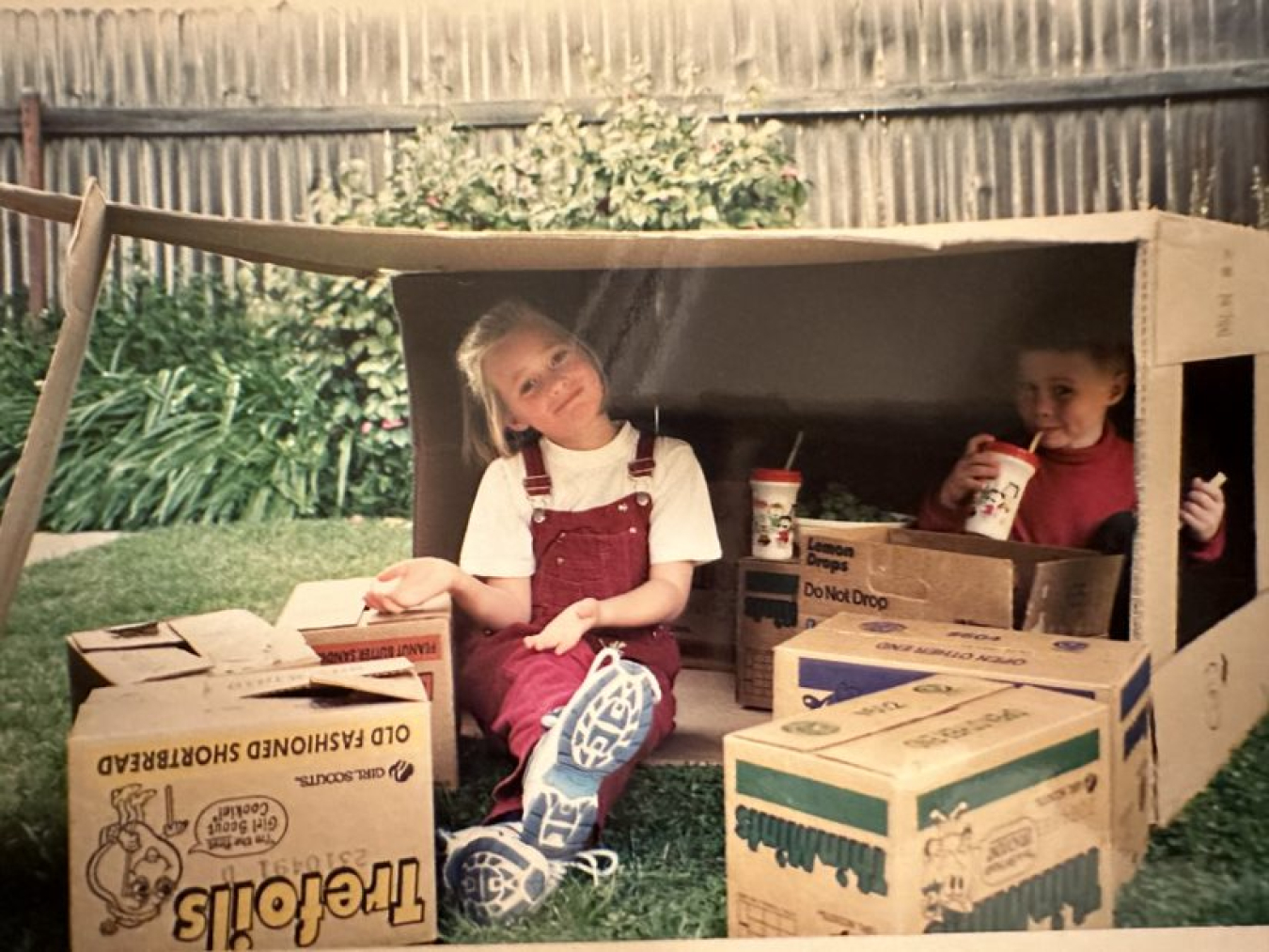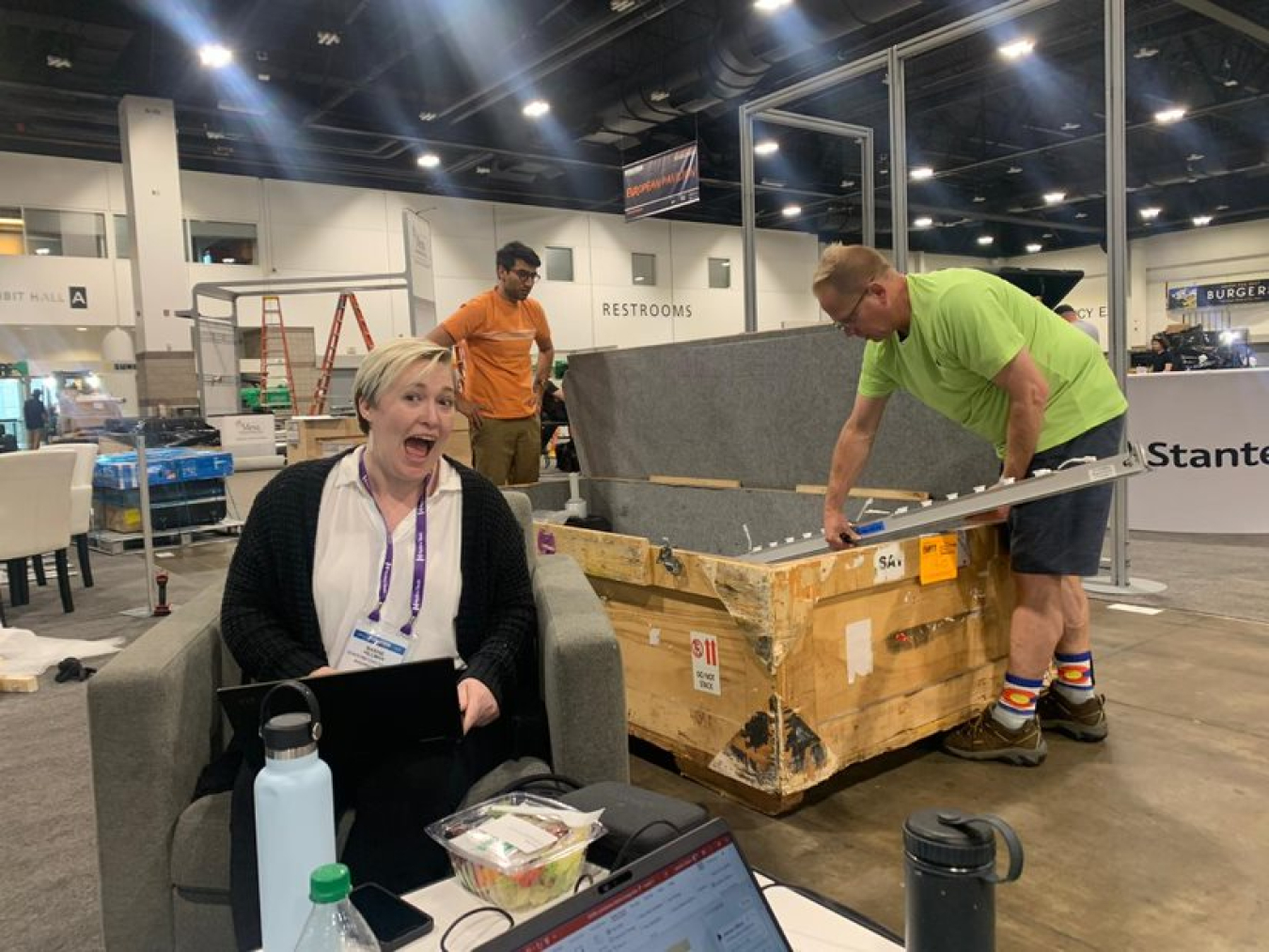At the Water Power Technologies Office, Maxine Hillman helps people understand climate challenges and solutions with her work on large national events and explainer videos that translate complex science related to hydropower and marine energy.
Water Power Technologies Office
August 15, 2023Beside the house, along a passageway overgrown with bushes, and just below the kitchen window: That’s where the fairies lived.

Or at least that’s where Maxine Hillman wanted them to live. Between two of those child-sized bushes, she built a little house for the sprites and waited for the sound of their butterfly wings. Even if they didn’t come, Hillman could conjure a host of creatures—from mermaids and knights to wizards and dragons—to keep her company.
“Maybe even otters sometimes,” Hillman said. “It was a lot of creating pretend worlds and living in them.”
As a senior communications analyst and contractor supporting the U.S. Department of Energy’s Water Power Technologies Office (WPTO), Hillman (a self-dubbed “reformed theater kid”) is still building worlds. Only now, her creations—mostly large national events and explainer videos that help translate complex science—are full of hydropower and marine energy instead of fairies and otters. And their plots are very real.
“I’m from California, and we did climate change and environmental issues early and often,” said Hillman, who grew up in Los Angeles. She remembers the city smog, beachside tsunami warnings, and the moment she learned about the hole in the ozone layer above Australia.
But she doesn’t have to remember the wildfires. “My home state has been on fire more and more as I’ve gotten older,” Hillman said. “The air quality can be poor, the state can be sliding or flooding. You name it, we got it.”
Ripple Effect
WPTO's Ripple Effect series features individuals whose impactful work will help advance hydropower and marine energy technologies to achieve a clean energy future.
Now, Hillman wants to help others understand—and overcome—these climate challenges. Although she didn’t know what she wanted to be when she grew up (and still isn’t sure!), she does know the world needs more clean energy—and fast. And water power is key to a speedy transition.
“It boils down to saving the world, right?” she said.
Hillman shared why she needed more than TV pupuserías, which fictional schoolteacher she aspires to be, and why she’s invested in hydropower and marine energy.
-
When you were a kid, you built all these pretend worlds. Did that help you build your career path, too?
I still don’t necessarily know what I want to be when I grow up. I know the effect I want to have. I want to leave the world better than I found it, and I'd love to be remembered as kind. Now, am I always effective in that? No, I’m a human being.
If you didn’t know what you wanted to do, how did you start to carve out some kind of path?
I was lucky that I had parents and grandparents who told me you don't go to college to learn how to do a job, you go to college to learn how to think. So, I double-majored in linguistics with a focus in language and society and in classical studies with a focus in Latin literature. Super-useful things that really map directly to real-world things.
I’m sensing some sarcasm there.
When I graduated, I didn’t know what to do, so I went to work in the family business. Luckily for me, the family business was film and television. I worked in art departments on TV shows for about a year and a half—again, creating worlds for other people to play in. Getting to read a script and say, ‘OK, they’re in a pupusería. What does this pupusería look like? How do we make this feel real?’
That sounds like the perfect adult version of your childhood make-believe. But you didn’t stick around. Why?
I liked what I was doing, but it wasn’t enough. I had a sense of justice. I’ve been rereading one of my favorite book series from when I was a kid, by Tamora Pierce, which is about young women in a fake medieval setting: they train as knights, have wild magic, and it’s all justice and honor and heroism. So, I loved creating worlds in film and TV, but you don’t have control over what the stories are that you’re helping to tell.
So, then what? Where did you go?
I ended up in D.C. and worked as a religious education associate at a Unitarian Universalist church. Basically, I created space for kids aged 0 to 18 to figure out who they are and how our actions can have ramifications for other people and the world. Then, I went to get my master’s in sociology and determine why people do what they do. In the meantime, I worked for an events company, planning medium- to large-scale events in the D.C. area. And then there was a pandemic, and people didn’t have medium- to large-scale events anymore.
What did you do?

For about a year, I nannied and worked in retail. And then I lucked out. A friend of mine knew there was an opening on the engagement and outreach team at WPTO. Now I’m here, and everything feels like it’s led to this. I get to do the multimedia and the video producer thing and create spaces for people to learn at events. That sense of justice gets satisfied because I get to do all this on behalf of fantastic scientists who are helping to make the world a better place.
Tell me more about your current job. Why do you care about this work?
It boils down to saving the world, right? It’s exciting to be on the forefront of something like marine energy—to see all the things it could do and see people right on the cusp of something great. It's also cool to have the deep sense of history that comes with hydropower while watching the tech evolve in real time and not just become more efficient but also have a lighter impact on its surrounding environment.
Now that you’ve been with WPTO for more than two years, are there any specific projects you’re most proud to have been a part of?
I got to help plan the Waves to Water Prize finale down in North Carolina and create a space for people to celebrate the teams and their work. The prize competitors developed and tested wave-powered desalination devices that could produce clean water using the power of ocean waves. And I just went to Denver for the finale of the Inclusive Energy Innovation Prize, during which teams presented their efforts to create a just and equitable clean energy future. If I do my job right, all event participants know what to expect before they arrive, so they don’t have to wonder about the logistics and can focus on their specific goals. They can just come in and do their jobs, whether that’s being a competitor, a reviewer, or anything else.
You’re kind of like electricity—an invisible but powerful force. In an ideal world, if you could accomplish anything, what would you want that to be?
It’s more about what we could help marine energy and hydropower achieve. My goal is to help expand our outreach beyond the hydropower and marine energy industries. How do we integrate with the larger renewable energy industry to, you know, save the world?
And what advice do you have for folks who, like you, want to save the world, but might feel a bit unsure how to do that?
If you’re someone like me who just wants to do good but isn’t fully sold on how, try and balance your high ideals with practicality. Focus on what you can do. And give yourself time in a new job before you start worrying that you’re on the wrong track. Like the optometrist, ask yourself, ‘Is it better or worse? Better or worse?’
This feels like an unfair question to ask someone who has lived in so many different worlds, but is there a fictional character that you most resonate with?
Because my goal is to create spaces for people to learn and grow and feel safe to explore: Ms. Frizzle from the Magic School Bus. She’s my aspirational work personality. I have two cats, not a lizard, but you can’t have everything.
Catch up on WPTO’s other Ripple Effect profiles and the Office of Energy Efficiency and Renewable Energy’s Clean Energy Champions.
And stay in the know with WPTO! Receive the latest information on funding opportunities, events, and other news by subscribing to the Hydro Headlines and Water Column newsletters, as well as the comprehensive Water Wire newsletter.

